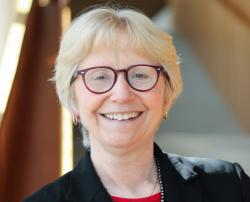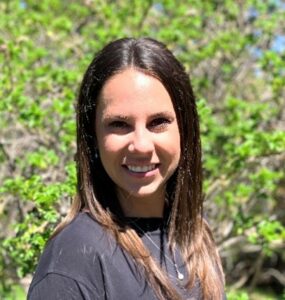
Date: Thursday, October 28, 2021
Time: 11:00 a.m. to 4:00 p.m. EST (Ontario/Quebec)
Location: Virtually via Zoom. The Zoom link will be provided via email to registered participants a few days before the forum date.
Theme: A voice to lead: Support and strategies to develop your future profession as a PhD prepared nurse
Registration fee: $40
Registration deadline: Sunday, October 24, 2021
Online registration form:
https://events.myconferencesuite.com/Virtual_Doctoral_Student_Forum_2021/reg/landing
Topic #1: Obtaining Tri-Council funding/post-Doctoral funding
Dr. Leah Lambert
 Dr. Lambert is the Executive Director and Senior Scientist of Nursing and Allied Health Research and Knowledge Translation at BC Cancer. She holds a cross appointment as a Clinical Assistant Professor at the UBC School of Nursing. During her PhD at UBC, Leah was supported by a Canadian Institutes of Health Research Strategic Training in Health Research (CIHR-STIHR) Psychosocial Oncology Research Training Fellowship and a four-year UBC Doctoral Fellowship, as well as several distinction awards including two UBC Faculty of Applied Science Graduate Awards on the basis of outstanding scholarship. Leah was the first embedded researcher at BC Cancer to hold a CIHR and Michael Smith Foundation for Health Research (MSFHR) Health System Impact Postdoctoral Fellowship. In her current role, Dr. Lambert and her team lead collaborative research and knowledge mobilization initiatives in partnership with health care practitioners, health system leaders, policymakers, and patients to generate evidence-informed improvements in care, better patient outcomes and increased system performance.
Dr. Lambert is the Executive Director and Senior Scientist of Nursing and Allied Health Research and Knowledge Translation at BC Cancer. She holds a cross appointment as a Clinical Assistant Professor at the UBC School of Nursing. During her PhD at UBC, Leah was supported by a Canadian Institutes of Health Research Strategic Training in Health Research (CIHR-STIHR) Psychosocial Oncology Research Training Fellowship and a four-year UBC Doctoral Fellowship, as well as several distinction awards including two UBC Faculty of Applied Science Graduate Awards on the basis of outstanding scholarship. Leah was the first embedded researcher at BC Cancer to hold a CIHR and Michael Smith Foundation for Health Research (MSFHR) Health System Impact Postdoctoral Fellowship. In her current role, Dr. Lambert and her team lead collaborative research and knowledge mobilization initiatives in partnership with health care practitioners, health system leaders, policymakers, and patients to generate evidence-informed improvements in care, better patient outcomes and increased system performance.
Presentation: Sally Thorne & Leah Lambert – CIHR Health System Impact Fellowship
Dr. Sally Thorne
 Dr. Thorne is Professor at the University of British Columbia School of Nursing. Dr. Thorne studies patient experience in serious and life-limiting conditions such as chronic disease and cancer, most recently focusing on palliative approaches to care delivery across sectors and nurses’ experiences with medical assistance in dying. In addition to advising various professional and policy organizations, she actively fosters nursing scholarship development through her philosophical and methodological activities and in her role as Editor-in-Chief of Nursing Inquiry.
Dr. Thorne is Professor at the University of British Columbia School of Nursing. Dr. Thorne studies patient experience in serious and life-limiting conditions such as chronic disease and cancer, most recently focusing on palliative approaches to care delivery across sectors and nurses’ experiences with medical assistance in dying. In addition to advising various professional and policy organizations, she actively fosters nursing scholarship development through her philosophical and methodological activities and in her role as Editor-in-Chief of Nursing Inquiry.
Presentation: Sally Thorne & Leah Lambert – CIHR Health System Impact Fellowship
Allie Slemon, RN, PhD (student)
 Allie Slemon [she/her] is a Registered Nurse and PhD candidate in her final year of studies in the School of Nursing at the University of British Columbia. She has a clinical background in mental health nursing and a range of teaching experience across clinical practicum and classroom settings. Allie’s doctoral work examines how nurses working in emergency departments describe promoting equity through patient care, and how social and institutional discourses shape how equity is enacted within these settings. Allie’s further research interests include qualitative research methods, nursing philosophy, mental health and well-being, and nursing education. Allie’s is grateful to have her work supported by a Social Sciences and Humanities Research Council (SSHRC) Joseph-Armand Bombardier Canada Graduate Scholarship (Doctoral), Killiam Doctoral Scholarship, and Four-Year Doctoral Fellowship through the University of British Columbia.
Allie Slemon [she/her] is a Registered Nurse and PhD candidate in her final year of studies in the School of Nursing at the University of British Columbia. She has a clinical background in mental health nursing and a range of teaching experience across clinical practicum and classroom settings. Allie’s doctoral work examines how nurses working in emergency departments describe promoting equity through patient care, and how social and institutional discourses shape how equity is enacted within these settings. Allie’s further research interests include qualitative research methods, nursing philosophy, mental health and well-being, and nursing education. Allie’s is grateful to have her work supported by a Social Sciences and Humanities Research Council (SSHRC) Joseph-Armand Bombardier Canada Graduate Scholarship (Doctoral), Killiam Doctoral Scholarship, and Four-Year Doctoral Fellowship through the University of British Columbia.
Presentation: Allie Slemon & Victoria Bungay – Obtaining Tri Council Funding
Dr. Victoria Bungay
 Dr. Bungay is a Professor in the School of Nursing at the University of British Columbia and holds a Canada Research Chair in Gender, Equity and Community Engagement. As the Director of the Capacity Research Unit, her work focuses on addressing socio-economic and political inequities (e.g., marginalization) that negatively affect people’s health and well-being including the devastating effects of stigma, discrimination and violence. She is interested in how research partnerships can positively impact communities that are regularly excluded in health and social policy and programming that affect their lives and how community-based interventions support real world evidence.
Dr. Bungay is a Professor in the School of Nursing at the University of British Columbia and holds a Canada Research Chair in Gender, Equity and Community Engagement. As the Director of the Capacity Research Unit, her work focuses on addressing socio-economic and political inequities (e.g., marginalization) that negatively affect people’s health and well-being including the devastating effects of stigma, discrimination and violence. She is interested in how research partnerships can positively impact communities that are regularly excluded in health and social policy and programming that affect their lives and how community-based interventions support real world evidence.
Presentation: Allie Slemon & Victoria Bungay – Obtaining Tri Council Funding
Lauren Orser, RN, PhD (student)
 Lauren Orser is a PhD student at the University of Ottawa, School of Nursing. She holds a Vanier Scholarship from the Canadian Institutes of Health Research, Institute of Infection and Immunology, Field of Nursing. Her clinical nursing experience is centered mental health, harm reduction and sexual health and her primary research interests focus on sexually transmitted infections, sexual health, HIV prevention, and long-term HIV management among marginalized population groups. She has authored more than 25 peer-reviewed publications in these research domains and has received over $500,0000 in research funding as a co-investigator or collaborator from the Ontario HIV Treatment Network and the Canadian Institutes of Health Research. Lauren’s doctoral research aims to explore the effects of sexualized methamphetamine use among HIV sero-positive gay, bisexual, and other men who have sex with men (gbMSM) by examining the intersecting factors of HIV-related stress, mental health, substance use, and addiction within this group.
Lauren Orser is a PhD student at the University of Ottawa, School of Nursing. She holds a Vanier Scholarship from the Canadian Institutes of Health Research, Institute of Infection and Immunology, Field of Nursing. Her clinical nursing experience is centered mental health, harm reduction and sexual health and her primary research interests focus on sexually transmitted infections, sexual health, HIV prevention, and long-term HIV management among marginalized population groups. She has authored more than 25 peer-reviewed publications in these research domains and has received over $500,0000 in research funding as a co-investigator or collaborator from the Ontario HIV Treatment Network and the Canadian Institutes of Health Research. Lauren’s doctoral research aims to explore the effects of sexualized methamphetamine use among HIV sero-positive gay, bisexual, and other men who have sex with men (gbMSM) by examining the intersecting factors of HIV-related stress, mental health, substance use, and addiction within this group.
Presentation: Lauren Orser – Dave Holmes – Obtaining Doctoral Research Funding
Dr. Dave Holmes
 Dave Holmes is Professor and University Research Chair in Forensic Nursing. After completing his B.Sc. (Ottawa, 1991), M.Sc. (Montreal, 1998) and Ph.D. (Montreal, 2002) in Nursing, Professor Holmes completed a CIHR post-doctoral fellowship in Health Care, Technology and Place at the University of Toronto, Faculty of Social Work (2003). To date, Pr Holmes received funding, as principal investigator, from CIHR and SSHRC, to conduct his research program on risk management in the fields of Public Health, Psychiatric Nursing, and Forensic Nursing. Most of his work, comments, essays, analyses and research are based on the poststructuralist works of Deleuze & Guattari and Michel Foucault. His works have been published in top-tier journals in nursing, criminology, sociology and medicine. Professor Holmes has published over 175 articles in peer reviewed journals and 55 book chapters. He is co-editor of Critical Interventions in the Ethics of Health Care (Routledge, 2009), Abjectly Boundless: Boundaries, Bodies and Health Care (Routledge, 2010), (Re)thinking Violence in Health Care Settings: A Critical Approach (Routledge, 2011), Power and the Psychiatric Apparatus (Routledge, 2014), Critical Approaches in Nursing Theory and Nursing Research: Implications for Nursing Practice (V&R Unipress, 2017) and, Radical Sex between Men: Assembling Desiring-Machines (Routledge, 2018). He has presented at numerous national and international conferences. He was appointed as Honorary Visiting Professor in Australia, Canada, Indonesia, the United States and the United Kingdom.
Dave Holmes is Professor and University Research Chair in Forensic Nursing. After completing his B.Sc. (Ottawa, 1991), M.Sc. (Montreal, 1998) and Ph.D. (Montreal, 2002) in Nursing, Professor Holmes completed a CIHR post-doctoral fellowship in Health Care, Technology and Place at the University of Toronto, Faculty of Social Work (2003). To date, Pr Holmes received funding, as principal investigator, from CIHR and SSHRC, to conduct his research program on risk management in the fields of Public Health, Psychiatric Nursing, and Forensic Nursing. Most of his work, comments, essays, analyses and research are based on the poststructuralist works of Deleuze & Guattari and Michel Foucault. His works have been published in top-tier journals in nursing, criminology, sociology and medicine. Professor Holmes has published over 175 articles in peer reviewed journals and 55 book chapters. He is co-editor of Critical Interventions in the Ethics of Health Care (Routledge, 2009), Abjectly Boundless: Boundaries, Bodies and Health Care (Routledge, 2010), (Re)thinking Violence in Health Care Settings: A Critical Approach (Routledge, 2011), Power and the Psychiatric Apparatus (Routledge, 2014), Critical Approaches in Nursing Theory and Nursing Research: Implications for Nursing Practice (V&R Unipress, 2017) and, Radical Sex between Men: Assembling Desiring-Machines (Routledge, 2018). He has presented at numerous national and international conferences. He was appointed as Honorary Visiting Professor in Australia, Canada, Indonesia, the United States and the United Kingdom.
Presentation: Lauren Orser – Dave Holmes – Obtaining Doctoral Research Funding
Topic #2: Tips on building a program of research
Dr. Julia Lukewich
 Dr. Julia Lukewich is an Associate Professor with the Faculty of Nursing, cross-appointed to the Division of Community Health & Humanities at Memorial University. She received her PhD in Nursing at Queen’s University. Dr. Lukewich is a leader in her field of research, which is focused on improving delivery of primary healthcare through the optimization of primary care nursing within team-based models of primary care. Her program of research consists of a variety of research projects supported by a number of provincial and national research grants, including several from the Canadian Institutes of Health Research. She has a strong record of publication and has been the recipient of several awards/recognitions acknowledging her academic impacts. Most notably, Dr. Lukewich successfully led a pan-Canadian team of expert researchers and nursing leaders, in partnership with the Canadian Nurses Association, Canadian Family Practice Nurses Association, and the Canadian Association of Schools of Nursing, in the development of national competencies for registered nurses in primary care. In June 2020, she began her tenure as President of the Canadian Family Practice Nurses Association, where she provides a voice and mentorship for nurses in primary care across Canada, sets and supports the strategic direction of the association, and ensure excellence in governance. Dr. Lukewich has expertise in quantitative research methods, including cross-sectional designs, systematic reviews, scoping reviews, and secondary data analysis. Her research has tremendous value for patients, healthcare providers, policy-makers, employers, and educators across the country.
Dr. Julia Lukewich is an Associate Professor with the Faculty of Nursing, cross-appointed to the Division of Community Health & Humanities at Memorial University. She received her PhD in Nursing at Queen’s University. Dr. Lukewich is a leader in her field of research, which is focused on improving delivery of primary healthcare through the optimization of primary care nursing within team-based models of primary care. Her program of research consists of a variety of research projects supported by a number of provincial and national research grants, including several from the Canadian Institutes of Health Research. She has a strong record of publication and has been the recipient of several awards/recognitions acknowledging her academic impacts. Most notably, Dr. Lukewich successfully led a pan-Canadian team of expert researchers and nursing leaders, in partnership with the Canadian Nurses Association, Canadian Family Practice Nurses Association, and the Canadian Association of Schools of Nursing, in the development of national competencies for registered nurses in primary care. In June 2020, she began her tenure as President of the Canadian Family Practice Nurses Association, where she provides a voice and mentorship for nurses in primary care across Canada, sets and supports the strategic direction of the association, and ensure excellence in governance. Dr. Lukewich has expertise in quantitative research methods, including cross-sectional designs, systematic reviews, scoping reviews, and secondary data analysis. Her research has tremendous value for patients, healthcare providers, policy-makers, employers, and educators across the country.
Presentation: Julia Lukewich – Tips on building a program of research
Dr. Kelley Kilpatrick

Photo credits: Owen Egan/Joni Dufour
A nurse with 20 years of experience in intensive care, Dr. Kelley Kilpatrick obtained her PhD in Nursing at McGill University in 2010. She completed her postdoctoral fellowship with the Chair Program in Advanced Practice Nursing at McMaster University in 2011. She joined the McGill Ingram School of Nursing as Associate Professor and holder of the Susan E. French Chair in Nursing Research and Innovative Practice, an endowed Chair, in 2019. She is a regular researcher with the Centre intégré universitaire de santé et de services sociaux (CIUSSS) de l’Est-de-l’Île-de-Montréal-Hôpital Maisonneuve-Rosemont Research Centre and with the Canadian Centre for Advanced Practice Nursing (APN) Research.
Dr. Kilpatrick’s research program focuses on team processes to open the ‘black box’ of how APN roles support teams and improve care. Her innovative research provides new insights into how to foster patient involvement in care and improve outcomes, including the critical role of team processes, role clarity for APNs, and involving family members in high functioning teams. A Fonds de recherche du Québec-Santé Senior Research Scholar, Dr. Kilpatrick’s work is also supported by the Canadian Institutes of Health Research, the Ministère de la Santé et des Services sociaux du Québec, and the Newton Foundation/McGill Faculty of Medicine and Health Sciences. Her research has influenced APN role implementation in Québec and internationally. She has authored or co-authored 119publications (83 are peer-reviewed. She has given over 175 presentations and facilitated knowledge translation about APN nationally and internationally.
Dr. Patrick Lavoie
 Patrick Lavoie, RN, Ph. D., is an assistant professor in the Faculty of Nursing at the Université de Montréal and a researcher at the Montreal Heart Institute. His research focuses on critical care education. He is particularly interested in understanding how nurses and healthcare professionals develop capacities for decision-making and clinical judgment in life-threatening situations. He has expertise in educational innovation, experiential learning, and diverse teaching strategies (including clinical simulation, debriefing, and reflection). Methodologically, he specializes in evaluation and measurement, mixed-methods, and knowledge synthesis.
Patrick Lavoie, RN, Ph. D., is an assistant professor in the Faculty of Nursing at the Université de Montréal and a researcher at the Montreal Heart Institute. His research focuses on critical care education. He is particularly interested in understanding how nurses and healthcare professionals develop capacities for decision-making and clinical judgment in life-threatening situations. He has expertise in educational innovation, experiential learning, and diverse teaching strategies (including clinical simulation, debriefing, and reflection). Methodologically, he specializes in evaluation and measurement, mixed-methods, and knowledge synthesis.
Patrick currently holds a research scholar award from the Fonds de recherche du Québec for a research program on nurses’ clinical judgment and decision-making when patients experience hemorrhage or cardiac arrest. He founded the first mobile eye-tracking laboratory dedicated to understanding clinical judgment in critical care. His work has been supported by the Canadian Foundation for Innovation, the Fonds de recherche du Québec (health and humanities branches), and Quebec’s Ministry of Health and Social Services. To learn more, please visit https://www.labolavoie.ca.
Presentation: Patrick Lavoie – Tips on Building a Program of Research
Dr. Margot Latimer
 Dr. Margot Latimer is a settler Canadian with Scottish ancestry and a Professor in the School of Nursing, Faculty of Health and is cross-appointed in the Department of Medicine, Dalhousie University. Her professional clinical experience has been in child and family tertiary care settings prior to transitioning to secondary education and research roles. She holds a CIHR Research Chair in Indigenous Health Nursing and a scientific appointment at the IWK Health Centre and is a faculty in the IWK Centre for Pediatric Pain Research. She works closely with community to mobilize Indigenous knowledge and co-leads the CIHR funded research “Aboriginal Children’s Hurt and Healing” Initiative with Mi’kmaq Health Director, Sharon Rudderham. In addition, she is a co-lead on the Indigenous stream of the CIHR Chronic Pain Network. Margot is married and has three young adult children.
Dr. Margot Latimer is a settler Canadian with Scottish ancestry and a Professor in the School of Nursing, Faculty of Health and is cross-appointed in the Department of Medicine, Dalhousie University. Her professional clinical experience has been in child and family tertiary care settings prior to transitioning to secondary education and research roles. She holds a CIHR Research Chair in Indigenous Health Nursing and a scientific appointment at the IWK Health Centre and is a faculty in the IWK Centre for Pediatric Pain Research. She works closely with community to mobilize Indigenous knowledge and co-leads the CIHR funded research “Aboriginal Children’s Hurt and Healing” Initiative with Mi’kmaq Health Director, Sharon Rudderham. In addition, she is a co-lead on the Indigenous stream of the CIHR Chronic Pain Network. Margot is married and has three young adult children.
Presentation: Margot Latimer – Charting a Successful Path Tips for Doctoral Studies
Topic #3: Job opportunities, roles, and connections for nursing doctoral students
Dr. Nancy Carter
 Dr. Nancy Carter is an Associate Professor and Assistant Dean of the Graduate Nursing Programs. Her clinical experience includes pediatrics and women’s health. Her PhD work included a needs assessment of men with metastatic prostate cancer to inform the development of an APN role. She also held a two year funded Post Doctoral award to promote knowledge translation of APN research to nursing and healthcare leaders. She supervises students at the Masters and PhD level.
Dr. Nancy Carter is an Associate Professor and Assistant Dean of the Graduate Nursing Programs. Her clinical experience includes pediatrics and women’s health. Her PhD work included a needs assessment of men with metastatic prostate cancer to inform the development of an APN role. She also held a two year funded Post Doctoral award to promote knowledge translation of APN research to nursing and healthcare leaders. She supervises students at the Masters and PhD level.
Dr. Carter’s current work at McMaster involves an evidence-based renewal of the curriculum for Masters, NP, and PhD Programs. She is a member of the Canadian Centre for Advanced Practice Nursing Research (CCAPNR). She has published over 50 peer-articles in related to nursing roles and health services. Currently her research focuses on how marginalized groups access primary and specialty health care and the development and evaluation of models of care which include Advanced Practice Nurses.
Presentation: Nancy Carter – Options for a Career or Work in Academia
Dr. Karen Harkness
 Dr. Karen Harkness has been a cardiovascular nurse for over 30 years and completed her PhD studies in 2009. Her graduate studies were supported by a Junior Research Fellowship Award (Heart and Stroke of Canada) and the FUTURE training program for Cardiovascular Nurse Scientists (CIHR). Between 2009-2014, Dr. Harkness was a cardiovascular nurse clinician scientist and supported by a Research Early Career Award (Hamilton Health Sciences) and New Investigator Award (Hamilton Health Sciences). She also is an Assistant Clinical Professor with the Faculty of Health Sciences at McMaster University and has over 40 peer reviewed publications. Dr. Harkness is the previous chair and current co-chair of the Nursing and Allied Health Council of the Canadian Heart Failure Society and the recipient of the 2021 Annual Achievement Award by the Canadian Heart Failure Society. Currently Dr. Harkness is a strategist/scientist and subject matter expert for heart failure and cardiac rehabilitation at CorHealth Ontario. This role includes engaging key stakeholders from clinical, research and administrative positions to help inform and improve health system design and patient- centred care in Ontario.
Dr. Karen Harkness has been a cardiovascular nurse for over 30 years and completed her PhD studies in 2009. Her graduate studies were supported by a Junior Research Fellowship Award (Heart and Stroke of Canada) and the FUTURE training program for Cardiovascular Nurse Scientists (CIHR). Between 2009-2014, Dr. Harkness was a cardiovascular nurse clinician scientist and supported by a Research Early Career Award (Hamilton Health Sciences) and New Investigator Award (Hamilton Health Sciences). She also is an Assistant Clinical Professor with the Faculty of Health Sciences at McMaster University and has over 40 peer reviewed publications. Dr. Harkness is the previous chair and current co-chair of the Nursing and Allied Health Council of the Canadian Heart Failure Society and the recipient of the 2021 Annual Achievement Award by the Canadian Heart Failure Society. Currently Dr. Harkness is a strategist/scientist and subject matter expert for heart failure and cardiac rehabilitation at CorHealth Ontario. This role includes engaging key stakeholders from clinical, research and administrative positions to help inform and improve health system design and patient- centred care in Ontario.
Presentation: Karen Harkness – Job opportunities, roles, and connections for doctoral students
Dr. Abigail Wickson-Griffiths
 Dr. Abigail (Abby) Wickson-Griffiths is an Associate Professor working with the Faculty of Nursing at the University of Regina, where she also serves the Gerontology Program Coordinator. She received a Bachelor of Science in Nursing, and a Doctor of Philosophy in Nursing from McMaster University, as well as a Master of Nursing degree from Ryerson University. She was an Interdisciplinary Fellow with the Technology Evaluation in the Elderly Network (now Canadian Frailty Network) for post-doctoral work focused on evaluating the use of the Palliative Performance Scale in the long-term care home setting. Abby’s primary research interests are a palliative approach and end-of-life care, dementia care, quality of living and dying in long-term care, and advance practice nursing. She is a provincial research lead for various Strengthening a Palliative Approach in Long-Term Care focused studies (spaltc.ca). Currently, she is the provincial lead in a national study, Implementing & Scaling Up the Long-Term Care Palliative Toolkit During COVID, which seeks to support long-term care home residents, family caregivers, and staff in the pandemic context. Abby is also an active member of the Saskatchewan Long-Term Care Network, which aims to support Saskatchewan’s long-term care residents and their communities to achieve optimal wellbeing. She teaches about nursing foundations of care, health promotion for older adults, and rural and remote populations, and the advance practice nurse’s role in health promotion.
Dr. Abigail (Abby) Wickson-Griffiths is an Associate Professor working with the Faculty of Nursing at the University of Regina, where she also serves the Gerontology Program Coordinator. She received a Bachelor of Science in Nursing, and a Doctor of Philosophy in Nursing from McMaster University, as well as a Master of Nursing degree from Ryerson University. She was an Interdisciplinary Fellow with the Technology Evaluation in the Elderly Network (now Canadian Frailty Network) for post-doctoral work focused on evaluating the use of the Palliative Performance Scale in the long-term care home setting. Abby’s primary research interests are a palliative approach and end-of-life care, dementia care, quality of living and dying in long-term care, and advance practice nursing. She is a provincial research lead for various Strengthening a Palliative Approach in Long-Term Care focused studies (spaltc.ca). Currently, she is the provincial lead in a national study, Implementing & Scaling Up the Long-Term Care Palliative Toolkit During COVID, which seeks to support long-term care home residents, family caregivers, and staff in the pandemic context. Abby is also an active member of the Saskatchewan Long-Term Care Network, which aims to support Saskatchewan’s long-term care residents and their communities to achieve optimal wellbeing. She teaches about nursing foundations of care, health promotion for older adults, and rural and remote populations, and the advance practice nurse’s role in health promotion.
Presentation: Abigail Wickson-Griffiths – Job Opportunities Roles Connections for PhDs
Contact Information:
For more information or if you have questions, please contact Roxanne Nizio, Events Coordinator, at rnizio@casn.ca.


